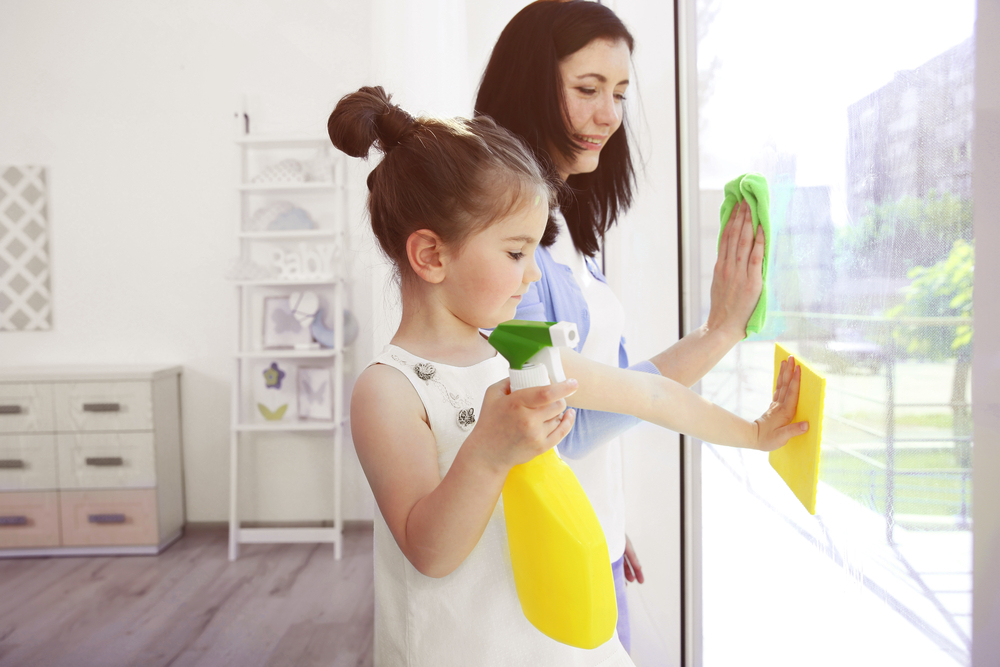Being a parent is wonderful and rewarding, but there is no denying that it can be tricky trying to juggle all the household tasks, as well as raising little ones.
Luckily, once your little ones are old enough, you have extra pairs of hands to help you out. Teaching your children to help out around the house will make your household so much more harmonious, especially as they get older.
However, it can be a tricky task getting kids (and even adults) to pitch in with the housework – after all, while some people certainly do find cleaning very therapeutic and satisfying, to many others it’s just a boring task that they would rather avoid.
So how do you instil a sense of pride in helping take care of your home in your kids? Here are a few tried and tested tips for teaching your little ones to help make your house a home.
Ask for them to be your little helper
When asking your little ones to do chores around the house, the way in which you do so can make a world of difference, particularly when it comes to how willing they are to carry out their assigned tasks.
Studies have shown that children respond much better to being asked to be mummy or daddy’s helper, than to simply being asked to help with tasks that they find boring and can’t understand the benefit of – chances are they would much rather keep playing instead, so the way you ask is very important.
People want to be seen as good, and children are no different. While helping is something that is useful and nice, helpers are good and virtuous people, and it seems that this is a difference that children are able to appreciate. Kids in the study cited above were 20 percent more likely to stop what they were doing and help when referred to as a helper!
Give praise
Your little ones want you to be happy with them and proud of what they do – after all, they love and look up to you. So an important part of making sure that helping out around the house doesn’t become a chore is giving thanks and praise.
Make sure your little one is told how much you appreciate their help, and point out how well they have done their chosen task. If they struggle, show them how it’s done and help them to master whatever task it is you’ve asked them to help with. They will feel pride at having learned something new, and it’s a lovely opportunity to bond.
Work together as a team
While it may be tempting to send your little one off to complete a task on his or her own if you are super busy, this is often a much less successful approach than tackling the chore together as a team.
It’s important to remember that kids will be kids, and they’d much rather be playing or spending time with you. While it can be frustrating to assign a task, and then find them playing instead, it shouldn’t come as a big surprise, and the scolding that often follows can actually have a negative impact on your little one’s desire to be helpful – they will feel bad if you make them feel like they have disappointed you for just being a kid.
Rather than wasting lots of time nagging and scolding, approach the task together and delegate to your little one to make them feel important and like they are part of Team Awesome with you.
Demonstrate the value of helping out
Even adults hate feeling nagged, but “if you help mummy clear away your toys quickly we might have time for a trip to the park this morning” offers an incentive to help complete the task at hand, while also emphasising the importance of it being done. It lets them know that the tidying is important and must take priority, but that they can help you so you have more time to do fun activities together.
The more they pitch in, the more of your time they help to free up, which means that you can do more fun things together!
Make sure you incorporate getting them to help out into your daily routine, and they will learn to expect chores as a part of life.
Start from a young age
Studies have shown that children who help out in the home from a young age are more conscientious and helpful outside the home and into adulthood too, which is a quality that will get them far in life.
Children who have been taught to help out and who aren’t used to everything being done for them tend to be more successful, and better at both collaboration and independent tasks.
Rather than waiting until your child is a certain age before you start asking for help, make it something that is always a part of their daily life.
Of course, it’s important to make sure that the tasks are age-appropriate – even just asking your little one to hold something for you if they’re really young and being sure to thank them afterwards will set them on the right path.
Incorporate simple tasks into their daily routines at a young age such as putting away their own toys, and as they grow older you can ask for help with more complex tasks like raking the lawn or hoovering their bedrooms.
We hope that these five tips on how to get your children to help out around the house were useful. Be sure to keep an eye on our blog for further research and parenting tips, or why not take a look at our fantastic range of doll’s prams and pushchairs, which can help your little one to explore the world of imaginative play?

